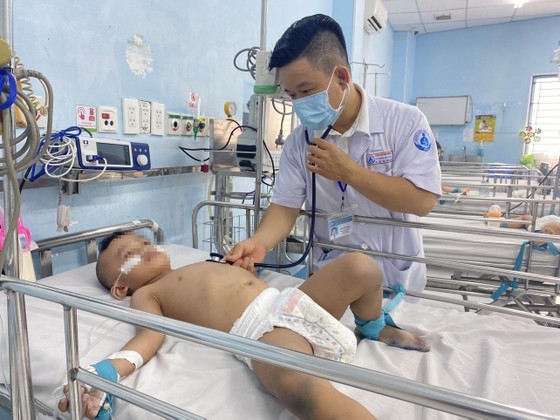 |
HFMD examination for pediatric patients at Children's Hospital 1 in HCMC |
While Prime Minister Pham Minh Chinh has issued directives to the Ministry of Health and other relevant departments to promptly tackle the recent shortages of medicines and medical supplies, as of now, various localities are still grappling with deficits in medicines, diagnostic chemicals, medical provisions, and even blood.
Update the treatment protocol for HFMD
Recently, several southern provinces and cities, including An Giang, Kien Giang, and Can Tho, have witnessed a notable surge in cases of hand, foot, and mouth disease (HFMD). Unfortunately, there is a shortage of vital medications, such as Immunoglobulin, Phenobarbital, and Milrinone, leading to the transfer of many severe pediatric cases to Ho Chi Minh City for treatment. Consequently, some children have not received prompt medical attention, resulting in severe complications and tragically, fatalities.
According to data provided by the Pasteur Institute of HCMC, there has been a significant increase in HFMD cases in the Southern region from the beginning of this year to the present, with the number doubling compared to last year. Tragically, there have been 23 reported fatalities. The first peak in HFMD cases occurred at the end of July and the start of August, followed by a gradual decline. However, from the beginning of September, HFMD cases began to rise again and have been steadily increasing. In the past week, the number of HFMD cases has exceeded the first peak of the year and continues to rise further.
Given the circumstances, experts advise tertiary hospitals to promptly acquire a comprehensive stock of vital medicines and essential medical equipment to ensure proper on-site diagnosis, treatment, and patient care. Furthermore, they propose actively engaging in remote consultations for complex cases with tertiary hospitals to reduce the risk of unsafe hospital transfers.
Local Health Departments provide support, urge, and supervision to hospitals regarding the supply of medicines and medical equipment. According to some experts, the current medications for treating HFMD generally align with the treatment guidelines issued by the Ministry of Health.
Nonetheless, two specific medications, Immunoglobulin and Phenobarbital, crucial for severe patient cases, are currently facing supply challenges. These medications are wholly reliant on imports. Therefore, the Ministry of Health has continued encouraging enterprises and distributors to boost imports and ensure sufficient stock of these two drugs for disease treatment.
The Ministry of Health is also suggesting that localities adopt even more proactive measures in disease prevention and control. These measures include strengthening surveillance and outbreak management and intensifying public communication to ensure public understanding and compliance with disease prevention measures. Treatment facilities should rigorously implement patient triage and classification, along with providing suitable patient referrals.
Shortages of vaccines and essential medications
At present, the vaccine supply in the Expanded Program on Immunization (EPI) in HCMC and nationwide is gradually dwindling. Many healthcare centers in HCMC have long been facing a shortage of vaccines, leading to an insufficient supply for preventing diseases in children.
Mrs. Nguyen Thi Mai Huong, 32 years old, residing in District 12, recounted how she took her child to the Dong Hung Thuan Ward Health Station in District 12 to receive the DPT-VGB-Hib vaccine (5-in-1 vaccine). Unfortunately, the healthcare staff informed her that the "5-in-1" vaccine was currently out of stock and recommended that, if possible, she should consider having her child vaccinated according to the recommended schedule through a private vaccination service provider at a cost of over VND1 million per dose.
According to the HCMC Department of Health, the vaccine supply for the expanded immunization program in the city is gradually diminishing. Vaccines such as DPT-VGB-Hib (the "5-in-1" vaccine), measles-rubella, measles, tetanus, and hepatitis B are projected to last for just a few more days.
The HCMC Department of Health has instructed the HCMC Center for Disease Control (HCDC) to continue efficiently coordinating the remaining vaccine supply among localities in the city and offer guidance to ward and commune health stations to meticulously manage and review lists of children due for new vaccinations, booster shots, and provide early vaccinations as soon as the vaccine supply is replenished. Not only vaccines for the EPI are in short supply, but many places are also experiencing shortages of medications for common diseases.
At Ba Ria General Hospital in Ba Ria - Vung Tau Province, despite having medications in reserve until the end of the last quarter of 2023, the current supply is inadequate to meet the growing healthcare demands, especially given the increasing patient numbers. While essential medications are in stock, there is a significant shortage of commonly used treatment drugs. Consequently, the hospital has had to substitute medications in the treatment process and explain this situation to patients.
Vung Tau General Hospital is currently grappling with a medicine shortage, particularly traditional medicines. A Ba Ria - Vung Tau Provincial Department of Health representative explained that the root cause of this shortage lies in the delayed progress of centralized drug procurement contracts compared to the initial expectations. This delay has, in turn, led to healthcare facilities being somewhat passive in their efforts to procure and supply medications. Furthermore, the prices of certain types of medicines have risen higher than the publicly disclosed bid results on the Electronic Information Portal of the Drug Administration of Vietnam. As a result, some suppliers have chosen not to participate in the bidding process.
The Mekong Delta region is facing a shortage of blood supply. The Hematology and Blood Transfusion Hospital in Can Tho City has issued a notice to healthcare facilities in the Mekong Delta, informing them of the temporary suspension of blood product deliveries due to challenges in procuring chemicals, medical supplies, and equipment for the 2023-2024 period.
Despite being the blood supplier for 74 hospitals and healthcare centers in the region, as of October 17, the hospital only has 86 units of blood in stock, while the weekly demand for blood supply in the Mekong Delta is 2,800-3,000 units, equivalent to 12,000-15,000 units per month.
























